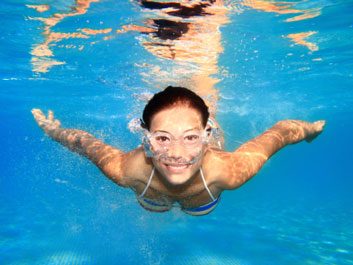The fitness benefits of swimming
Get in some ‘me time’ while shaping up for swimsuit season

Source: Best Health Magazine, May 2012
Swimming has been an important part of my life for more than 20 years, but I didn’t come to it easily. As a child I never learned to swim and was terrified of the water. I didn’t want my kids to suffer the same embarrassment, so I enrolled them in swim lessons. Watching them made me determined to overcome my fear.
At age 26, heart pounding, I signed up for swim lessons.
It wasn’t easy. After numerous sessions, my first pool length left me breathless (mostly from fear!) and clinging to the edge. Did I really have to swim all the way back? Over time, I completed 10 lengths, then 20, 30, 40, 50. I now combine a variety of strokes’back crawl, breaststroke, side stroke and elementary backstroke.
My laps provide ‘me time,’ but I’ve developed camaraderie with the other regulars, who range in age from 20s to 90s. They have become a support group, wondering where I am if I don’t show up. Some do laps, some join in group aquacize classes, some do water-walking.
Hitting the pool three times a week not only keeps me flexible and lithe, but has coaxed me back from grief and injury. When a series of tragic family deaths enveloped me in despair, I dragged myself to the pool and pictured all five sitting on the edge at the deep end with my dog, cheering me on. Slowly I came back to join the living. When a car accident left me in pain from bulging discs in my back, I turned to swimming combined with water-walking, physiotherapy and stretching for rehabilitation. It worked.
Swimming provides all-around fitness results, improving cardio, flexibility, tone and strength while exercising a variety of muscle groups. ‘Unlike dry-land exercises, swimming engages your entire body,’ says Cory Beatt, who coaches Olympic hopefuls on the Simon Fraser University swim team. ‘With nothing to stabilize you in the water, you’re forced to use your core.’
Swimming leaves you feeling refreshed, and can be done with or without equipment. It’s especially beneficial and safe if you have an injury or joint condition. ‘We recommend swimming to our clients,’ says Toronto-based Mary Aisen, a physiotherapist with The Arthritis Society. ‘The first thing I ask clients is whether they can swim. Even if they can’t, just moving in the water helps.’
Try to swim three times a week’your body will thank you, and by the time summer returns you’ll be ready for the beach!
This article was originally titled "Splashing through winter" in the May 2012 issue of Best Health. Subscribe today to get the full Best Health experience’and never miss an issue!




